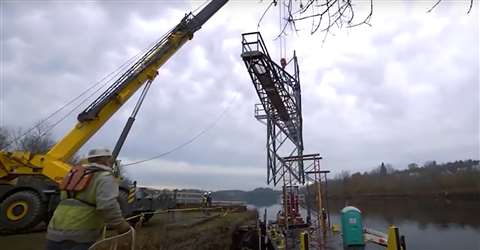Why nine citizens will decide the fate of $1 billion construction project
17 April 2023
 Construction work on the NECEC transmission line (Image: Avangrid)
Construction work on the NECEC transmission line (Image: Avangrid)
Just nine ordinary US citizens could be about the decide the fate of the construction of a $1 billion power transmission line project, at least in the short term.
The New England Clean Energy Connect (NECEC) project involves transmitting hydro energy from Canada through Maine on a 145-mile (233km) high-voltage line, which is capable of 1,200 MW transmission.
The company building the line, Avangrid (a subsidiary of Spanish contractor Iberdrola), says that NECEC is the shortest of all identified paths from Québec and uses an existing transmission corridor for nearly two thirds of its length to minimise the impact on communities, scenery and the environment.
Legal mire
But the project has been mired in legal difficulties and delays since its inception in 2017.
Central Maine Power, owned by Avangrid, in partnership with Hydro-Québec was among 45 bidders. The project was initially delayed until 2019 after an appeal by a rival bidder, before a delay obtaining a key permit from the Public Utilities Commission pushed the construction start date back further.
An attempt to overturn that approval via a citizen referendum delayed the project again, although the referendum was ultimately ruled unconstitutional in August 2020.
It was because of these delays, developers have argued, that they needed to speed up the construction schedule once work started in January 2021, after the US Department of Energy issued a presidential permit.
But in late 2021, 59% of voters in Maine said they were opposed the project in another referendum and work was forced to stop.
By the time the referendum took place Avangrid had cleared more than three quarters of the corridor and installed around 100 poles.
Avangrid filed a lawsuit in Maine Superior Court in response, arguing that the law cannot be changed to halt a project. Having started the work before the referendum took place, Avangrid has argued that it has vested rights that ought to nullify the referendum result.
In August 2022, Maine’s Supreme Judicial Court ruled that the referendum’s retroactive nature violated the developers’ constitutional rights if substantial construction had started in good faith.
But opponents of the project argue that construction work was speeded up with the goal of gaining vested rights. And they have won the right for a jury to make a determination on the case.
Justice Michael A. Duddy granted permission for a jury trial to go ahead, where nine jurors (and two alternates) will decide the fate of the project.
That trial is now underway, leaving the fate of a $1 billion project in the hands of nine ordinary citizens. It is expected to last at least two weeks.
‘Unusual situation’
“It’s a very unusual situation – perhaps unprecedented – to have an energy asset’s fate decided by a jury that was pooled from a citizenry that voted to reject the project,” says Timothy Fox, vice president of independent energy market research company Clearview Energy Partners.
“It does appear that NECEC opponents have an inherent advantage now that the case will be decided by a jury.”
However, whichever party eventually loses the case, the fate of the transmission line project is unlikely to end there, with the case likely to go to the Supreme Court.
And even if the project were eventually to get the go-ahead to resume construction, other delays are possible.
In February this year, the Federal Energy Regulatory Commission (FERC) ordered energy company NextEra Energy Resources to upgrade a circuit breaker at its Seabrook nuclear power plant in New Hampshire, which will be required to accommodate the NECEC project.
NextEra is likely to see reduced revenue if NECEC goes ahead because the power delivered by the transmission line is expected to reduce the wholesale price of electricity.
It is now taking FERC’s decision to court in a process that could take another year to resolve.
Implications for clean energy construction projects
The way in which the case is dragging on illustrates the challenges new clean energy projects in North America face, according to Fox.
“I think everyone agrees that the US needs much more transmission in order to reach both national and sub-national decarbonisation efforts. But it hasn’t gotten any easier to build transmission,” he says.
“One of the things we stressed with the passage of the Inflation Reduction Act was that many provisions in that law provided financial support to encourage new transmission but it didn’t the tackle the biggest hurdles to new project development and that is the permitting process and the legal fights that inevitably occur.
“What is somewhat unique about this particular project is that it is only in Maine. If a transmission line needs to cross states you need to get permits from each state and balancing the demand of each state and the timing of the permitting process of each state can be increasingly difficult.
“We’ve seen a general trend, and this is the latest data point of it, of opponents of really any energy asset pivoting to the people, trying to get these decisions decided in the court of public opinion because the average voter will have some degree of NIMBYism and not want to support a project, even if it is viewed as green or carbon-free.”
STAY CONNECTED


Receive the information you need when you need it through our world-leading magazines, newsletters and daily briefings.
CONNECT WITH THE TEAM










